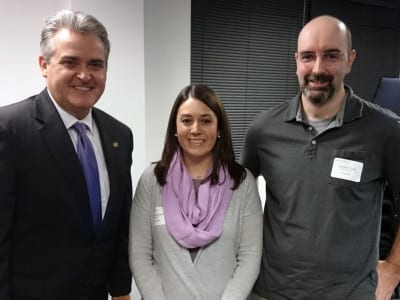
Assemblyman Steven McLaughlin, Kara Sokowlowski and Ben Long at Science Fellows Recognition Dinner
New Lebanon science teachers Kara Sokowlowski and Ben Long spent this last summer working along researchers in labs as part of a unique professional development opportunity offered by Questar III BOCES Summer Science Research Program for Teachers. They were two of seven teachers selected for first year science fellows.
Sokowloski worked with Dr. Morgan Schaller from RPI analyzing sediment from Lake George to study climate change, and Long worked with Dr. Ellen Braun-Howland from the Wadsworth Center studying cyanobacteria, and how different environmental factors can increase the likelihood for the bacteria to produce toxins.
Stepping back into the role as students helped both teachers empathize with how their students might feel on their first day of class.
“Walking into the lab my first day, I had no idea where anything was located, felt unsure of what I was doing and was afraid of making mistakes,” said Long.
Sokowloski said at the beginning of her experience there was a huge learning curve. She had to understand the background material first, in order to know what was going on in the lab. This made her think about making connections to prior knowledge and experiences in every topic.
“I teach so the students can connect the material to their own lives in some way,” said Sokowloski. “Throughout my summer at RPI, I saw Dr. Schaller solving problems every day. This school year, I have tried to incorporate more problem solving into my curriculum with authentic problems for the student to work on.”
“Before becoming a teacher, I had wanted to be a research scientist,” said Long. “Conducting research and working in a lab makes you look at things with a different mindset, and I was able to bring some of that way of thinking back into my classroom.”
Sokowloski wanted to participate in the program because she felt being a “scientist” would really help her grow as a teacher. “I’m glad I was accepted because I benefited in many other ways as well through the professional development days at Questar III, collaboration with the other science teachers in the program and connections with faculty and students at RPI.”
Both were awarded grants to spend in the New Lebanon science department and will participate next summer as second year fellows.
